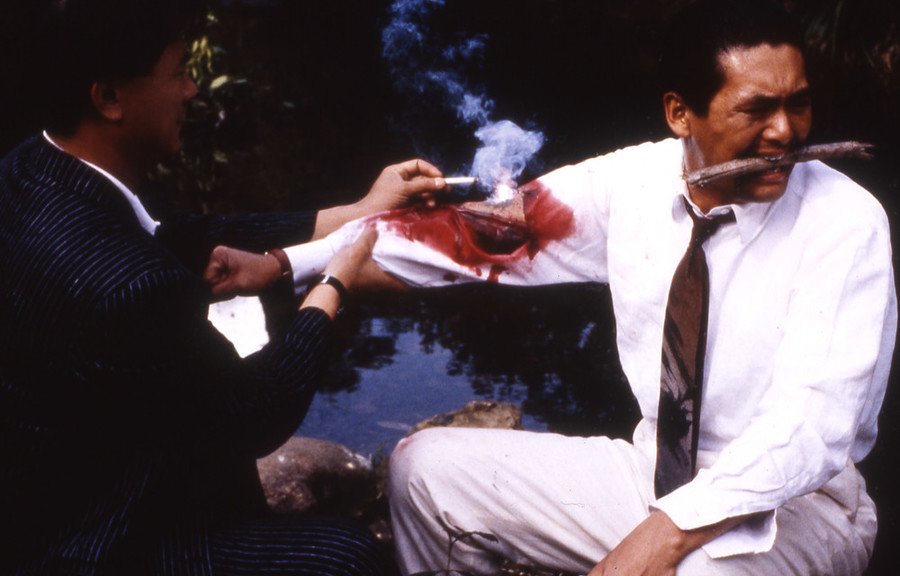Archiwum - 9. Festiwal Filmowy Pięć Smaków
Killer
Nagrody i festiwale
Opis filmu
Arcydzieło kina gangsterskiego i melodramatu jednocześnie, najbardziej uznany międzynarodowo hongkoński film Woo. Jest tu wszystko z czego słynie reżyser – tragiczni bohaterowie, arcystylowe i pełne emocji sceny akcji oraz białe gołębie pośród gradu kul. Elementy te składają się na kompletną całość, która na dobre umieściła Hongkong na światowej mapie kina gatunkowego.
"Killer" to historia o lojalności i zdradzie, o winie i jej odkupieniu. Ah Jong jest płatnym zabójcą, kierującym się kodeksem honorowym, likwidującym jedynie przestępców. Podczas wykonywania swojego ostatniego zlecenia przypadkiem sprawia, że wzrok traci Jennie, śpiewaczka w nocnym klubie. Targany wyrzutami sumienia zabójca postanawia zaopiekować się dziewczyną i zdobyć pieniądze na operację mającą przywrócić jej wzrok. Sprawy komplikują się, gdy wychodzi na jaw, że nie jest już potrzebny swoim pracodawcom i został na niego wydany wyrok śmierci. Śladami Ah Jonga podąża również bezkompromisowy policjant, Li Ying. Losy bohaterów przetną się i choć stoją oni po dwóch stronach prawa, zrozumieją, że mają ze sobą wiele wspólnego.
Jak wszystkie filmy Woo z tego okresu, "Killer" jest głęboko zanurzony w filmowej rzeczywistości i utkany z odniesień do szeregu ulubionych dzieł reżysera. Zadedykowany Martinowi Scorsese obraz jest hołdem dla "Samuraja" Melville’a, z którym dzieli postać bohatera – samotnego zabójcy, polującego na swoje ofiary w miejskiej dżungli, zdradzonego przez pracodawcę. Znaleźć w nim można także silne nawiązania do "Wspaniałej obsesji", mniej znanego melodramatu Douglasa Sirka.
W tytułowej roli znakomicie odnalazł się Chow Yun-fat – to tu najlepiej widać ideał postaci, do którego zawsze dążył Woo. Wysoki, elegancki, z białym szalikiem na szyi, aktor jest godnym kontynuatorem tradycji bohatera, którego ucieleśnieniem byli wcześniej chociażby Alain Delon czy Steve McQueen.
"Killer" to ostatni wspólny film Johna Woo i Tsui Harka. Współpraca dwóch tak silnych osobowości okazała się być na dłuższą metę niemożliwa.
Marcin Krasnowolski
John Woo
Urodzony w 1946 roku w południowych Chinach, wychowywał się w Hongkongu. Karierę zaczynał jako asystent reżysera w legendarnym Shaw Brothers Studio (pomagał m.in. Changowi Chehowi, legendzie kina wuxia). Zadebiutował w roku 1973, ale przełomem okazało się dopiero "Lepsze jutro" z 1986 roku, zrealizowane przy współpracy z Tsuiem Harkiem. Kolejne hongkońskie filmy Woo potwierdziły jego reputację mistrza sekwencji akcji – eksperymenty z montażem i brawura z jaką łączył konwencje gatunkowe zachodniego kina z filozofią kina Wschodu wydatnie przyczyniły się do rozwoju współczesnego języka filmowego. Po roku 1992 Woo wyjechał do Hollywoodu, gdzie odniósł spore sukcesy, m. in. za sprawą "Bez twarzy" i drugiej części serii "Mission Impossible". Zdecydował się wrócić do Chin, gdy ta rosnąca w siłę kinematografia stworzyła mu możliwość realizacji wysokobudżetowych filmów. Jego najnowszym dziełem jest dwuczęściowe "The Crossing", nazwane chińskim "Titanikiem".
1986 Lepsze jutro / Better Tomorrow
1987 Lepsze jutro 2 / Better Tomorrow II
1989 Killer
1990 Kula w łeb / Bullet in the Head
1991 Był sobie złodziej / Once a Thief
1992 Hard Boiled. Dzieci Triady / Hard Boiled
1997 Bez twarzy / Face/Off
2000 Mission: Impossible 2 / Mission: Impossible II
2015 The Crossing





